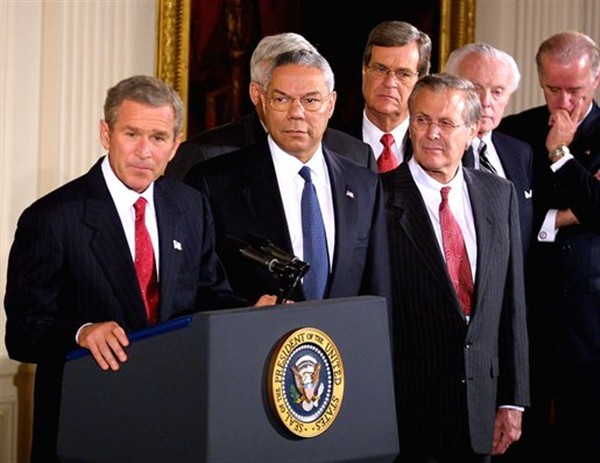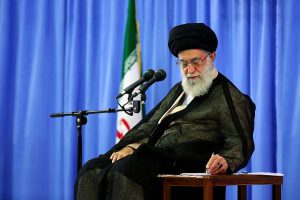by Daniel Luban
This week, as you’ve probably heard, marks the ten year anniversary of the US invasion of Iraq. Most people who have commented on the milestone have agreed that the war was a catastrophic mistake. But why, exactly, did the Bush administration decide to go into Iraq in the first place? Even a decade later, there’s still not much of a consensus — although Jim’s piece from 2003, reposted yesterday, provides as good a contemporaneous account as you’ll find. Is there anything more we can say with the benefit of ten years’ hindsight?
I tried to sort through possible war motives in a piece I wrote several years ago. (Space constraints meant that the final version was cut rather heavily, and I’d be happy to provide the original version, which included more evidence and fuller argumentation.) I argued there against the somewhat conspiratorial notion that there was a single “real motive,” concealed from the public and shared by all administration backers. The Weapons of Mass Destruction (WMD) argument was clearly far from the whole story, as Paul Wolfowitz himself conceded. But individual actors and factions within the administration had their own reasons for wanting war.
More to the point, the motives tended to overlap: most war-backers would not have said that invading Iraq was desirable to stabilize oil supplies but not to spread democracy, or to improve Israel’s security but not to deter nuclear terrorism. Rather, they tended to hold a rather utopian belief that invading Iraq would further all of these goals simultaneously. For that reason, assessing motives is more a matter of teasing out emphasis and priority than of reaching categorical judgments about which motives were or were not in play.
With all that said, however, I think we can identify at least four relatively distinct motives that played a role. I provide more in-depth evidence in my RightWeb piece, so I’ll just sketch out some of the conclusions here.
Oil. The allegation that Iraq was a “war for oil” was one of the most frequently leveled charges against it, and one that clearly has some legs. (Just yesterday, for instance, Glenn Greenwald touched on the theme.) However, the notion of a “war for oil” is an imprecise one. It can mean two different things, one less plausible and one more so.
The first (and seemingly most widespread) meaning is that the Iraq war was primarily intended to allow the US (or US oil companies) to get their hands on oil reserves located on Iraqi soil. This is largely unpersuasive. There’s evidence (some of which Greenwald cites) that US policymakers such as Dick Cheney hoped that a post-reconstruction Iraq would greatly step up oil production and provide an alternative to Saudi oil, but there’s little evidence that this was regarded as a primary reason for invasion rather than simply a welcome collateral benefit. US oil companies themselves were lukewarm about the invasion, fearing that it might destabilize the region — and indeed, they haven’t been the primary beneficiaries of oil development in postwar Iraq.
The second (and more plausible) meaning is that the Iraq war was centrally concerned with preserving the stability of US oil supplies in the broader Gulf region as a whole. Here, the evidence is stronger: such “wars for oil” have been semi-official US policy since the promulgation of the Carter Doctrine in 1980, and this was certainly a primary motive for the first Gulf War in 1991. Saddam Hussein was regarded with more alarm than similarly brutal dictators elsewhere in the world largely because the risks of aggression in a geopolitically vital region like the Gulf were viewed as so much higher. Whether or not protecting the Gulf oil supply from Saddam was the primary reason for war, it was certainly an important one.
Israel. For many neoconservatives in the Bush administration, a major (perhaps the major) reason for ousting Saddam was to improve Israel’s security. Since the 1990s, when several future Bush administration figures prepared the notorious “Clean Break” report for Israeli Prime Minister Benjamin Netanyahu, neoconservatives had been preoccupied with the notion that regime change in Iraq would touch off a broader regional transformation that would disempower Israel’s opponents in the Middle East.
There are some caveats that should be made. First, although neoconservatives were the leading proponents of war, the broader “Israel lobby” as conventionally conceived did not play a particularly strong role (a clear point of contrast with the current campaign for war against Iran). Second, the fact that many in the US pushed for war out of Israel-related concerns did not mean that Israelis themselves were necessarily strong proponents — although figures on the Israeli right with strong ties to neoconservatives, such as Netanyahu himself, certainly were.
Even if neoconservatives inside and outside the administration were motivated in large part by concerns about Israeli security, this still doesn’t answer the question of how influential they were. After all, we should be wary of turning the top leadership (especially Bush, Cheney, and Rumsfeld) into mere vessels for neoconservative designs. As suggested below, I don’t think the Israel motive was paramount in the minds of this top leadership, although it was undoubtedly present. On the other hand, we shouldn’t downplay the instrumental role that neoconservatives played in setting the terms of debate over Iraq both before and after 9/11.
Payback. “We have been hit very hard,” a Cheney adviser told journalist Barton Gellman, “and we needed to make clear the costs to those who might have been supporting or harboring those who were contemplating those acts.” Or, as Jonah Goldberg (channeling Michael Ledeen) put it more bluntly, “Every ten years or so, the United States needs to pick up some small crappy little country and throw it against the wall, just to show the world we mean business.” On this line of thought, 9/11 required the US to make an example out of someone to demonstrate its continued strength. The Taliban was too small and weak to serve this purpose, but Saddam — who had already been in the crosshairs for unrelated reasons — fit the bill nicely.
Many people seem hesitant to attribute the invasion to such a seemingly subjective and psychologized motive; it sounds more hardheaded to attribute it to a material interest like oil. But I think we underestimate the strength of this motive at our own peril, and that — particular for Cheney and Rumsfeld, who to my mind were the two critical decision-makers — it may even have been the primary one.
Democracy. The democracy promotion motive has become somewhat overemphasized in recent years, for several reasons. In the run-up to war, it was the motive that appealed most to pro-war liberal opinion-makers in the media, and thus received a disproportionate amount of discussion. Once the WMDs failed to materialize, the Bush administration fell back on democracy promotion as its main justification for the war, a trend that reached its height in Bush’s 2005 second inaugural address. And once the war went south, it became the easiest line of attack for critics who were eager to cast themselves as hardheaded skeptics and the Bush administration as wide-eyed utopians.
The fact of the matter is that democracy promotion was probably not the central motive for most of the war’s architects. This isn’t to say that it was always or totally insincere, however. Most notably, Bush himself seems genuinely to have bought into his own rhetoric. And although many (myself included) expected the administration simply to set up a friendly dictator to rule over postwar Iraq, this isn’t the course they followed or even really attempted. Whatever the many flaws of Nouri al-Maliki’s government, it is by no means a US puppet, and it did come to power through something resembling a democratic process (backed, to be sure, by a good bit of force).
To what extent were these four motives mutually exclusive? We should note, first of all, that the latter two flow in some sense out of the first two. The US had for decades regarded the Middle East as a geopolitically vital region, due both to its reliance on Gulf oil and its interest in the Israel-Palestine conflict. This intense focus on the Middle East helps explain why, in the significantly transformed post-9/11 landscape, the US seized on Saddam Hussein (rather than a figure with more significant ties to terrorism) as the proper test case for its efforts both at restoring deterrence and at democratic transformation. The hope was that success in Iraq would reverberate throughout the region.
At the same time, however, the tension between the final two motives (between payback and democracy) helps indicate some of the contradictions of the project. Thomas Friedman got at some of this tension when he suggested the “right reason” for war was “to partner with Arab moderates in a long-term strategy of dehumiliation and redignification,” but the “real reason” was “to go right into the heart of the Arab world and smash something — to let everyone know that we, too, are ready to fight and die to preserve our open society.” In typical fashion, Friedman did not bother to question whether these two goals were complementary or contradictory, and whether “shock and awe” was reconcilable with “dehumiliation and redignification.” But we’ve witnessed the various contradictions between these motives play out for ten years now.
Photo: President George W. Bush signs H.J. Resolution 114 authorizing the use of force against Iraq. Secretary of State Colin Powell, center, and Secretary of Defense Donald Rumsfeld, right, also attended the signing. White House photo by Paul Morse.






I, for one, would have been interested in the longer version. However, I wonder if at any point in the missing material the author attempts to think through the Bush Administration theory of the war on its own terms, since in each major instance it would tend to magnify each of the four motives isolated: Oil geopolitics, for instance, is not merely a question of stability of supply in relation to the global economy, but, again in the Bush or, loosely speaking, neoconservative theory, represents a potential dynamic multiplier of the dangers posed by a hostile and coherent Iraqi regime, as demonstrated during the ’80s-’90s. In theory, an oil-wealthy post-sanctions Iraq would have been able to threaten the region again, and hold it hostage, with its uncertain, and psychologically distracting or terrorizing WMD capacities and intentions as a further factor. Furthermore, the perception of retreat from the absolute commitment to oil flow as “vital interest,” at the same time that the U.S. was escalating a multi-level, theoretically multi-decade “war on terror,” affects potentially every aspect of the prosecution of the latter. According to the doctrine of “pre-emptive” “war against terror” – or what we could call neo-imperial projection or what others call forward defense – such a turn of events would simply be intolerable: It would represent the failure of a critical node of the global network, and any such failure exposes the entire network to complete failure – therefore requiring a massive response a la Gulf War I, potentially under less favorable terms, at the escalating to the next higher level of crisis. Therefore, even if “resurgent Saddamism” is far from a certain course of future events, the policy must reduce the likelihood of its occurrence to near-zero. I would not suggest that this logic or kind of logic is the only logic available to a would-be American strategist, but it was and remains part of a coherent strategic rationale that an electorate can intuit in the simple words like “we are better off without Saddam,” and that a less war-weary electorate, which we will likely someday have again, may very well again find decisive.